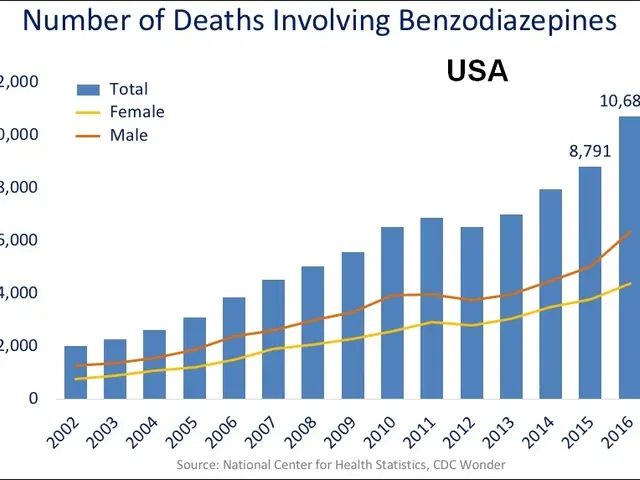Testosterone's Impact on Slimming Down and Muscle Development
Optimizing Testosterone Production for Fat Loss and Muscle Growth
Boosting testosterone levels naturally can significantly enhance fat loss and muscle growth. Here are some key lifestyle changes and dietary modifications to help you achieve this goal.
Key Lifestyle Changes:
- Strength Training: Engage in resistance training 3-4 times a week to directly stimulate natural testosterone production and support muscle growth [1][3][4].
- Quality Sleep: Aim for 7-9 hours of high-quality sleep nightly, as poor sleep sharply lowers testosterone levels and increases cortisol, a hormone that can reduce testosterone [1][3][4].
- Stress Management: Chronic stress elevates cortisol, negatively impacting testosterone. Use meditation, deep breathing, yoga, or nature walks to reduce stress [1][3].
- Maintain Healthy Weight: Excess body fat is linked to lower testosterone. Achieving and maintaining a healthy weight through diet and activity helps optimize testosterone [3].
- Increase Overall Activity: Beyond workouts, stay physically active throughout the day to signal your body to maintain hormone production [1].
Dietary Modifications:
- Healthy Fats: Testosterone synthesis requires fats; prioritize heart-healthy fats such as avocados, olive oil, nuts, seeds, and fatty fish (e.g., salmon) [1][5].
- Complex Carbohydrates: Support workout energy with complex carbs like quinoa, oats, brown rice, and sweet potatoes to stabilize blood sugar without refined sugar crashes [5].
- Micronutrients:
- Zinc: Found in oysters, beef, lentils, pumpkin seeds; important for testosterone metabolism [1][3][5].
- Vitamin D: Obtain from midday sun exposure, fatty fish, egg yolks, or supplements to support healthy testosterone levels [1][3][5].
- Magnesium: Present in leafy greens and almonds; contributes to testosterone production, sleep quality, and energy [1][5].
- Whole Foods Focus: Emphasize fruits, vegetables, whole grains, and minimize processed foods, sugary drinks, and unhealthy fats as these can disrupt hormone balance [3][5].
Habits to Avoid:
- Limit or avoid excessive caffeine, frequent alcohol consumption, nicotine use, and cannabis, as these can negatively affect testosterone [1].
- Avoid ultra-processed foods high in sodium, added sugars, and artificial additives that may impair hormone production [5].
By implementing these changes consistently, you can improve testosterone naturally, contributing to enhanced fat loss and muscle growth. If low testosterone symptoms persist despite lifestyle improvements, consider professional hormone testing and personalized interventions [1][3].
Summary Table:
| Area | Recommendations | |--------------------|-------------------------------------------------------------------| | Exercise | Strength training 3-4x/week; stay active daily | | Sleep | 7-9 hours high-quality sleep nightly | | Stress | Use meditation, deep breathing, yoga, or nature exposure | | Weight | Maintain a healthy weight through diet and exercise | | Dietary Fats | Avocados, olive oil, nuts, seeds, fatty fish | | Carbohydrates | Complex carbs: quinoa, oats, brown rice, sweet potatoes | | Micronutrients | Zinc, Vitamin D, Magnesium-rich foods | | Habits to Avoid | Excess caffeine, alcohol, nicotine, cannabis, ultra-processed foods |
Following these integrated lifestyle and dietary strategies provides a strong foundation to naturally boost testosterone for improved body composition and muscle development. Using tools like body fat calipers or smart scales to track changes in fat and muscle percentages over time can help monitor progress. Vitamin D is essential for testosterone production and muscle health. Chronic stress elevates cortisol levels, which suppress testosterone. Testosterone production peaks during REM sleep.
- To stimulate natural testosterone production and support muscle growth, engage in resistance training 3-4 times a week, prioritize heart-healthy fats, and consume complex carbs like quinoa, oats, brown rice, and sweet potatoes.
- Maintain a healthy weight through a balanced diet and regular exercise, emphasizing fruits, vegetables, whole grains, and avoiding processed foods, sugary drinks, and unhealthy fats.
- Aim for 7-9 hours of high-quality sleep nightly to optimize testosterone levels, and manage stress by using meditation, deep breathing, yoga, or nature exposure.
- Boost micronutrients involved in testosterone production, such as zinc from oysters, beef, lentils, pumpkin seeds, vitamin D from sun exposure, fatty fish, egg yolks, or supplements, and magnesium from leafy greens and almonds.




